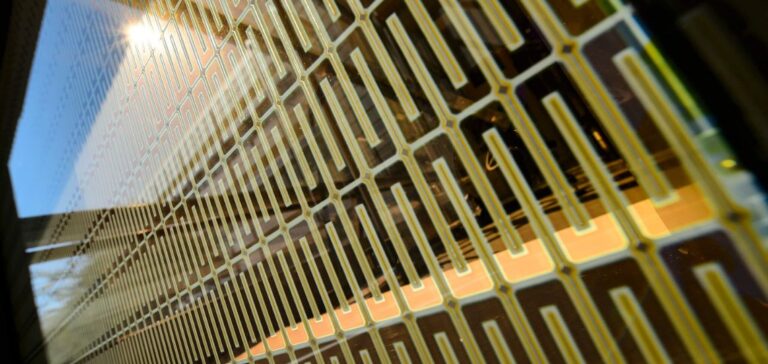Meyer Burger is establishing new partnerships for the development of solar modules with perovskite technology.
A technological cooperation
Meyer Burger is working on the development of new generation, high performance solar cells and modules. The company works with renowned partners such as CSEM in Switzerland, Helmholtz-Zentrum Berlin (HZB), or the Fraunhofer Institute for Solar Energy Systems ISE in Freiburg. In addition, the Institute for Photovoltaics at the University of Stuttgart is also a partner.
The company has signed multi-year cooperation agreements and is working on the industrialization of the perovskite tandem technology. This technology would allow the industrial production of solar cells with efficiencies of over 30% in the future. Marcel König, Head of Research and Development at Meyer Burger, says:
“With a long tradition of proprietary development, Meyer Burger has an extensive portfolio of processes, technologies and production techniques for potential mass production of tandem solar cells and modules in-house. This includes the core manufacturing processes and machinery for silicon-based perovskite tandem solar cells, as well as the corresponding solar modules with Meyer Burger’s proprietary SmartWire connection technology. Combined with the expertise of our academic partners, this is a unique recipe for success.”
The consortium builds on existing collaborations for the development of heterojunction silicon solar cells. Meyer Burger entered into collaborations to research perovskite technology. In the past, the company has worked with Oxford PV to develop proprietary technology solutions.
A potential to develop
Together with its partners, Meyer Burger is already achieving initial successes in the industrialization of perovskite technology. Indeed, the company and the CSEM reach a record efficiency of 29.6% for a perovskite tandem solar cell. In addition, it measures 25 square centimeters.
To achieve this result, the Swiss researchers combine heterojunction silicon cells with perovskite structures. Professor Christophe Ballif, Director of Sustainable Energy at CSEM, says:
“This outstanding result demonstrates the potential of silicon perovskite tandem cells to achieve high efficiencies. Although we still have a lot of work ahead of us, the industrialization of solar cells with efficiencies of more than 30 percent is well on the way.”
In addition, HZB achieves record efficiencies, among the best in the world, above 31% for tandem solar cells.
For Meyer Burger and its partners, it is a matter of applying the results to the manufacture of commercial products. The success of the perovskite/silicon tandem technology depends on the presence of a stable industrial production process. Moreover, perovskites are made up of individual components that are inexpensive and abundant.






















